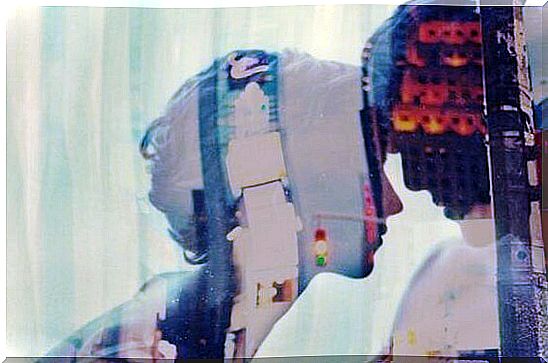Illusion Of Transparency: I’m Sick And You Don’t Notice It

Many people suffer from the illusion of transparency. They think that their emotions, their sadness or despair are visible at first sight and that we are all obliged to guess their state of mind, to immediately grasp their needs. The fact is, we’re not always an open book, so if we really need something, we have no choice but to be assertive.
You are probably all familiar with this phenomenon. In fact, most of us have experienced it firsthand in several ways. For example, when we speak in public it is normal to think “for sure everyone sees how nervous I am”, when in reality the public has only perceived our ability to speak and our confidence.
Other times we go home after having spent a very bad day, of those that see Murphy’s law come true in all its statements. However, the partner or family members are unable to pick up even a signal of this terrible day.
We are not all as transparent as we believe we are, our inner universes are not television screens or mirrors that reflect the emotional chaos we have inside. However, there is no reason to get angry or despair about it. Others are not obliged to scrutinize our face daily to “guess” if we are good or bad.
The ideal would be to spontaneously express aloud “what a bad day I had today!” . There are people who unfortunately get angry, feel diminished if others are unable to read their minds and understand what happens without having to put it into words.

Illusion of transparency: look how much I am suffering!
Carlo and Eva celebrate their anniversary this evening. They have been together for two years and have booked a table at a nice restaurant. However, Eva realizes that Carlo is taking a long time to get ready. Worried, she knocks on the bathroom door and asks if everything is okay. Shortly after, Carlo comes out and tells her he doesn’t want to go out to dinner, that he doesn’t like it.
Eva doesn’t understand what’s going on. With reluctance, Carlo reports that he doesn’t like it, that he doesn’t feel like celebrating the anniversary because he doesn’t believe that things are going well between them and that Eva doesn’t notice anything. Eva, bewildered and anxious, asks him what is wrong: “Things at work are not going well. Maybe they fire me, I’ve been in a situation of total anxiety for two days and you haven’t noticed anything ”. Eva’s answer is very simple: “But why didn’t you tell me anything?”.
This example actually reflects a very common situation, more than we think. There is not only a clear communication problem, but also a very dangerous cognitive distortion that prompts us to think that others are able to guess our emotional states at first glance, as if they have an infallible radar in identifying problems. .

On the other hand, always based on the example of Carlo and Eva, we can say that a person drags his worries behind him in solitude along with a clear illusion of transparency. Carlo is so aware of his emotional anguish that he takes it for granted that Eva also perceives it, but this does not always happen.
We are not mirrors: if we want or need something, we must learn to communicate it
We know that empathy, body language or the connection that exists with the people we love allows us to feel the needs or emotional states of others without having to express them in words. Sometimes, however, this connection can fail for various reasons.
One person can read an emotion in the other, but not the underlying problem. He may ask: “What’s going on?” and being answered: “Nothing”. The lack of communicative effectiveness and emotional immaturity are often added to the illusion of transparency. They are Trojan horses that insinuate themselves into emotional relationships and that we must learn to manage with firmness and maturity.

How to manage the illusion of transparency?
It is important to point out that everyone, some more or less, apply the illusion of transparency in everyday life and in the most disparate ways. As far as relationships are concerned, this is a very common dynamic because somehow we need the partner to guess what is happening to us, what we are missing, what we need.
We want a bond so intimate that we forget that love does not give us psychic, mental or supernatural powers. We cannot guess what the other person thinks or feels. For this reason, some aspects must be taken into account:
- We should not assume that the other person is forced to know what is happening to us at every moment of the day.
- A healthy emotional relationship is based on assertiveness, on the ability to openly express what we feel, what we need, what bothers us or hurts us.
- We are not as transparent as we think we are and the partner is not always receptive and able to intuit our emotional states on the fly as we believe. Sometimes, routine and work keep us busy and we are not so “addicted” to the partner, but that doesn’t mean we don’t love him or don’t care what concerns him.
- All concerns must be expressed and communicated immediately. Postponing or postponing only means increasing the problem which, therefore, becomes difficult to solve.
In conclusion, since the topic covered in this article is certainly not new to you, we invite you to work on your illusion of transparency and to reduce this cognitive distortion as much as possible to improve the quality of your interpersonal relationships.








